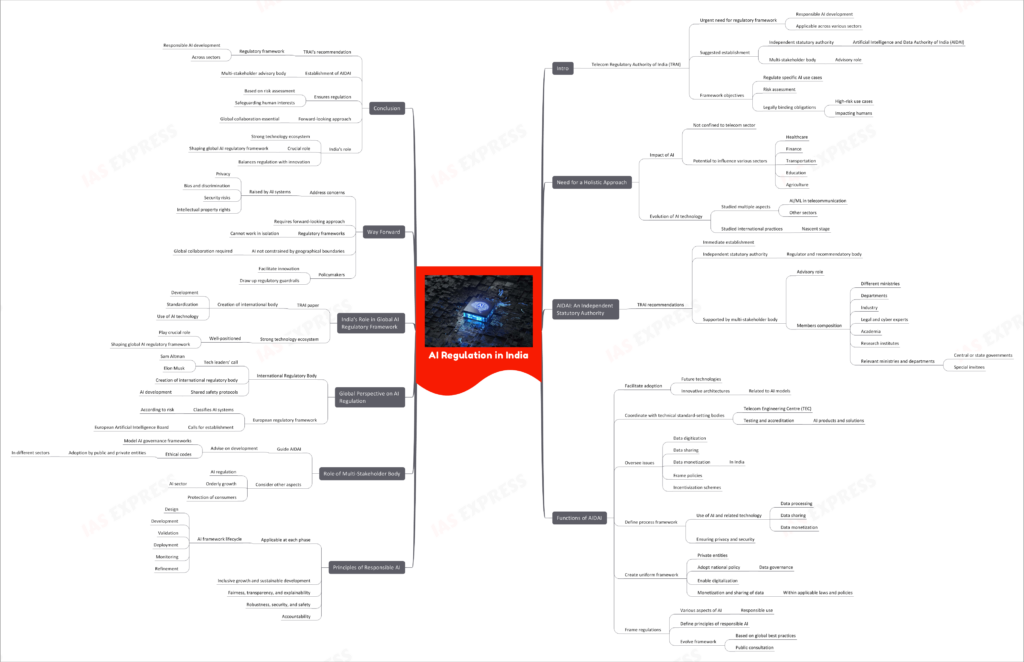AI Regulation in India- Highlights of TRAI Recommendations

India’s telecom regulator, Telecom Regulatory Authority of India (TRAI), has recently recommended the urgent need for a regulatory framework for responsible AI development, applicable across various sectors. It has suggested the establishment of an independent statutory authority, the Artificial Intelligence and Data Authority of India (AIDAI), supported by a multi-stakeholder body with an advisory role. This framework is essential to regulate specific AI use cases based on risk assessment and to ensure legally binding obligations for high-risk use cases impacting humans.

This topic of “AI Regulation in India- Highlights of TRAI Recommendations” is important from the perspective of the UPSC IAS Examination, which falls under General Studies Portion.
Need for a Holistic Approach
- TRAI emphasizes that the impact of AI is not confined to the telecom sector but has the potential to influence a wide range of sectors such as healthcare, finance, transportation, education, and agriculture. Hence, it is crucial to examine the impact of AI across all sectors rather than focusing solely on telecom.
- The regulator highlighted that AI technology is evolving, and it took time to examine and bring out multiple aspects of AI/ML in telecommunication and other sectors by studying international practices, which are also in the nascent stage.
AIDAI: An Independent Statutory Authority
- TRAI has recommended the immediate establishment of AIDAI as an independent statutory authority to act as a regulator and recommendatory body.
- AIDAI should be supported by a multi-stakeholder body with an advisory role, consisting of members from different ministries, departments, industry, legal and cyber experts, academia and research institutes, and representatives of relevant ministries and departments of central or state governments as special invitees.
Functions of AIDAI
- Facilitate adoption of future technologies and innovative architectures related to AI models.
- Coordinate with technical standard-setting bodies like Telecom Engineering Centre (TEC) for testing and accreditation of AI products and solutions.
- Oversee all issues related to data digitization, data sharing, and data monetization in India, including framing policies and incentivization schemes.
- Define the process framework for the use of AI and related technology in data processing, data sharing, and data monetization while ensuring privacy and security.
- Create a uniform framework for private entities to adopt national policy on data governance and enable digitalization, monetization, and sharing of data within applicable laws and policies.
- Frame regulations on various aspects of AI, including its responsible use, define principles of responsible AI, and evolve the framework based on global best practices and public consultation.
Principles of Responsible AI
TRAI specified that the principles of responsible AI should be made applicable at each phase of the AI framework lifecycle, including design, development, validation, deployment, monitoring, and refinement. These principles include:
- Inclusive growth and sustainable development.
- Fairness, transparency, and explainability.
- Robustness, security, and safety.
- Accountability.
Role of Multi-Stakeholder Body
- The multi-stakeholder body should guide AIDAI by advising on the development of model AI governance frameworks and ethical codes for adoption by public and private entities in different sectors.
- It should also consider other aspects of AI regulation for the orderly growth of the AI sector and protection of consumers.
Global Perspective on AI Regulation
International Regulatory Body
- Tech leaders like Sam Altman and Elon Musk have called for the creation of an international regulatory body and shared safety protocols for AI development.
- The European regulatory framework classifies AI systems according to the risk they pose and calls for the establishment of a European Artificial Intelligence Board.
India’s Role in Global AI Regulatory Framework
- The TRAI paper talks about the creation of an international body for the “development, standardisation, and use of AI technology.”
- Given India’s strong technology ecosystem, it is well-positioned to play a crucial role in shaping the global AI regulatory framework.
Way Forward
- Addressing wide-ranging concerns raised by AI systems, such as privacy, bias and discrimination, security risks, and intellectual property rights, requires a forward-looking approach.
- Regulatory frameworks cannot work in isolation as AI is not constrained by geographical boundaries; global collaboration is required.
- Policymakers must facilitate innovation, not stifle it, while drawing up regulatory guardrails.
Conclusion
The TRAI’s recommendation for a regulatory framework for responsible AI development across sectors is a welcome move. The establishment of AIDAI and a multi-stakeholder advisory body will ensure that specific AI use cases are regulated based on risk assessment, thereby safeguarding human interests. As AI impacts various sectors and raises numerous concerns, a forward-looking approach and global collaboration are essential. India, with its strong technology ecosystem, can play a crucial role in shaping the global AI regulatory framework, provided it balances regulation with innovation.
Practice Question for Mains
Comment on TRAI recommendations regarding AI regulation in India. What is the way ahead? (250 words)

